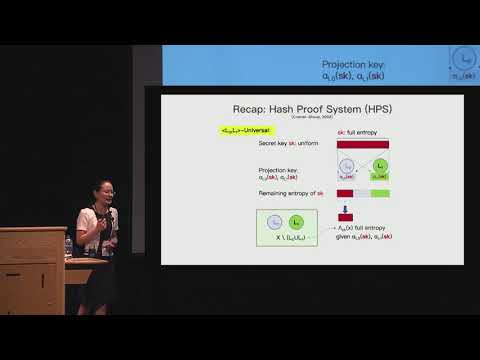CryptoDB
Tight Leakage-Resilient CCA-Security from Quasi-Adaptive Hash Proof System
| Authors: | |
|---|---|
| Download: |
|
| Abstract: | We propose the concept of quasi-adaptive hash proof system (QAHPS), where the projection key is allowed to depend on the specific language for which hash values are computed. We formalize leakage-resilient(LR)-ardency for QAHPS by defining two statistical properties, including LR-$$\langle \mathscr {L}_0, \mathscr {L}_1 \rangle $$-universal and LR-$$\langle \mathscr {L}_0, \mathscr {L}_1 \rangle $$-key-switching.We provide a generic approach to tightly leakage-resilient CCA (LR-CCA) secure public-key encryption (PKE) from LR-ardent QAHPS. Our approach is reminiscent of the seminal work of Cramer and Shoup (Eurocrypt’02), and employ three QAHPS schemes, one for generating a uniform string to hide the plaintext, and the other two for proving the well-formedness of the ciphertext. The LR-ardency of QAHPS makes possible the tight LR-CCA security. We give instantiations based on the standard k-Linear (k-LIN) assumptions over asymmetric and symmetric pairing groups, respectively, and obtain fully compact PKE with tight LR-CCA security. The security loss is $${{O}}(\log {Q_{{e}}})$$ where $${Q_{{e}}}$$ denotes the number of encryption queries. Specifically, our tightly LR-CCA secure PKE instantiation from SXDH has only 4 group elements in the public key and 7 group elements in the ciphertext, thus is the most efficient one. |
Video from CRYPTO 2019
BibTeX
@article{crypto-2019-29894,
title={Tight Leakage-Resilient CCA-Security from Quasi-Adaptive Hash Proof System},
booktitle={Advances in Cryptology – CRYPTO 2019},
series={Lecture Notes in Computer Science},
publisher={Springer},
volume={11693},
pages={417-447},
doi={10.1007/978-3-030-26951-7_15},
author={Shuai Han and Shengli Liu and Lin Lyu and Dawu Gu},
year=2019
}

